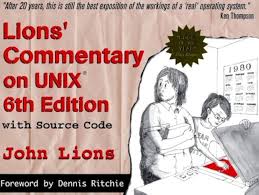A Commentary on the Sixth Edition UNIX Operating System
Introduction
John Lions's "A Commentary on the Sixth Edition UNIX Operating System" is a seminal work in computer science, offering an in-depth exploration of the Unix kernel's inner workings. This white paper delves into the key concepts presented in the book, highlighting its significance and enduring impact on the field of operating systems.
Core Concepts
Lions's commentary provides a line-by-line analysis of the Sixth Edition Unix kernel source code, elucidating the fundamental principles that underpin its design. Key concepts explored include:
- Process Management: The book examines how Unix manages processes, including process creation, scheduling, and termination. It discusses the role of the process table, context switching, and the system call interface.
- Memory Management: Lions delves into Unix's memory management techniques, such as paging, swapping, and memory allocation. It explains how virtual memory is implemented and how physical memory is efficiently utilized.
- File System: The book explores the structure and implementation of the Unix file system, including the concepts of inodes, directories, and file operations. It discusses the file system's organization on disk and the algorithms used for file access.
- Device Drivers: Lions provides a detailed overview of device drivers, focusing on character devices, block devices, and network devices. It explains how device drivers interact with the kernel and the hardware.
- Interrupts and Exceptions: The book discusses how Unix handles interrupts and exceptions, including the interrupt service routines and the exception handling mechanism. It explains how interrupts are prioritized and how the system responds to various error conditions.
Significance and Impact
Lions's commentary has had a profound impact on the field of operating systems. Its clear and concise explanations have made it an invaluable resource for students, researchers, and practitioners. Key contributions include:
- Educational Value: The book serves as an excellent learning tool, providing a hands-on approach to understanding operating system concepts.
- Historical Perspective: It offers a glimpse into the early days of Unix, showcasing the elegant design principles and innovative techniques employed by its creators.
- Inspiring Future Generations: Lions's commentary has inspired countless developers and researchers to explore the depths of operating systems and contribute to the advancement of the field.
Legacy and Modern Relevance
While the Sixth Edition Unix kernel may be outdated, the fundamental concepts and design principles presented in Lions's commentary remain relevant today. Many modern operating systems, including Linux and macOS, have inherited and built upon the foundations laid by Unix.
Conclusion
John Lions's "A Commentary on the Sixth Edition UNIX Operating System" is a timeless classic that continues to inspire and educate. Its meticulous analysis of the Unix kernel's source code provides a deep understanding of operating system concepts and serves as a valuable resource for anyone interested in the field. By studying this work, we can gain insights into the past and appreciate the evolution of operating systems, while also drawing inspiration for future innovations.
References
- Lions, J. (1977). A Commentary on the Sixth Edition UNIX Operating System. University of New South Wales.



